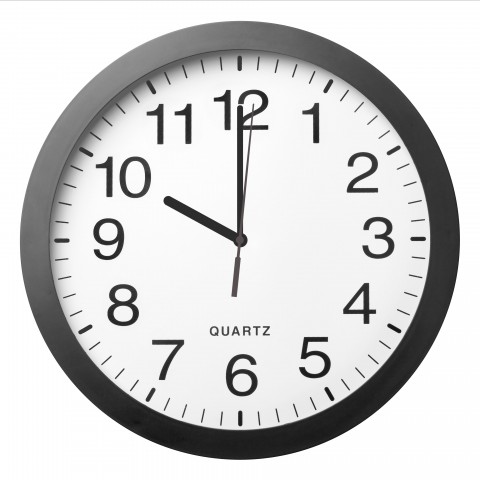
Despite the fact that nowadays most people have their cell phone on them to tell the time—if not a good, old-fashioned watch—you’re likely to find yourself in a situation where you need to know either how to ask the time in Hebrew or how to offer it when someone asks. And you never know when asking someone the time might turn into a longer conversation that may even lead to a friendship at the end of the day!
In a more general sense, being able to tell time in the Hebrew language is hugely helpful in your daily interactions, as time is one of the most universal topics. It helps us make plans, describe experiences, make sense of schedules, and much, much more.
So it’s a good idea to practice telling time in Hebrew, as well as the various words and phrases related to this area of language. Plus, as an added bonus, it provides you with an opportunity to go over your knowledge of numbers, as well.
It looks like it’s time to look at time!
 Table of Contents
Table of Contents
- How to Ask for the Time
- The Hours in Hebrew
- The Minutes in Hebrew
- Hours Divided into Minutes
- General Time Reference of the Day
- Time Adverbs
- Common Hebrew Sayings about Time
- Conclusion: Master Hebrew the Fun Way with HebrewPod101.com!
1. How to Ask for the Time

As mentioned, it’s pretty common to either need to ask the time in Hebrew or for someone to ask us the time. Whether we’re running to catch a bus, trying to get to a meeting on time, or maybe just trying to make sure we set our watch correctly after switching time zones on arriving in Israel, telling time is definitely one of those language essentials you’ll want to practice. The good news is that it isn’t terribly complicated telling time in Hebrew. Let’s have a look.
The first thing we want to know is how to ask the time. Below are a couple of ways to ask the time; the first is simple and direct, and the second is more formal. Remember that you should try to use the formal way if you’re addressing an elderly person or an official, or better yet, when speaking to any stranger.
- מה השעה?
Mah ha-sha’ah?
“What time is it?”
- האם אתה יודע מה השעה, בבקשה?
Haim atah yode’a ma ha-sha’ah, bevakashah?
“Do you have the time, please?”
If you want to ask not the time on the clock, but rather the time when an event is going to occur, you can ask in the following way:
- מתי ה_?
Matay ha_?
“What time is the _?”
For example:
- מתי הסרט עם בראד פיט?
Matay ha-seret im Brad Pitt?
“What time is the movie with Brad Pitt?”
- מתי האוטובוס לתל אביב יוצא?
Matay haotobus leTel Aviv yotze?
“When does the bus to Tel Aviv leave?”
2. The Hours in Hebrew

Now let’s have a closer look at the clock in Hebrew. We want to be sure we get to know the whole twenty-four hours, which is also a great way for us to practice our numbers!
A couple of important things to note here. First of all, in Hebrew, the notation system for hours is almost always given military style, using twenty-four instead of twelve hours. However, in spoken language, we say the hour using the twelve-hour system, if necessary adding an indicator for the time of day, much like we would use “A.M.” and “P.M.” in English.
I know this may sound a bit confusing at first, but it’s really quite simple once you get used to it. Let’s jump right in and start making some sense of it all.
The first thing we want to know, of course, is the word for “hour,” which we actually just saw. Here it is again, in singular form and then in plural form, followed by an example sentence:
- שעה
sha’ah
“Hour”
- שעות
shaot
“Hours”
- מה יותר נפוץ במדינה שלך, שעון בן 12 שעות או שעון בן 24 שעות?
Mah yoter nafotz bamedinah shelka, shaon ben shteym esrey shaot o shaon ben esrim vearbah shaot?
“What is more common in your country, a 12-hour clock or a 24-hour clock?”
Note that there’s no exact phrase for “o’clock” in Hebrew. However, to avoid confusion and assure that the listener knows you’re talking about the hour, you can add the following before giving the time:
- השעה…
Ha-sha’ah…
“The hour is…”
As for how to say time in Hebrew, imagine that the clock reads “13:00.” How do you think we might tell someone the time using the language above? Remember that in Hebrew, we use the twenty-four-hour system when writing, but when speaking we express time using the twelve-hour clock! Got it? Here’s the answer:
- השעה אחת בצהריים.
Ha-sha’ah achat ba-tzohorayim.
“It is 1:00 P.M.”
Now let’s look at the rest of the hours on the clock and how to say them all. Note that we use masculine numbers when giving the time.
| Time | Hebrew | Transliteration |
|---|---|---|
| “1:00 A.M.” | אחת לפנות בוקר | Achat lifnot boker |
| “2:00 A.M.” | שתיים לפנות בוקר | Shtayim lifnot boker |
| “3:00 A.M.” | שלוש לפנות בוקר | Shalosh lifnot boker |
| “4:00 A.M.” | ארבע לפנות בוקר | Arbah lifnot boker |
| “5:00 A.M.” | חמש לפנות בוקר | Chamesh lifnot boker |
| “6:00 A.M.” | שש בבוקר | Shesh lifnot boker |
| “7:00 A.M.” | שבע בבוקר | Shevah ba-boker |
| “8:00 A.M.” | שמונה בבוקר | Shmoneh ba-boker |
| “9:00 A.M.” | תשע בבוקר | Tesha ba-boker |
| “10:00 A.M.” | עשר בבוקר | Eser ba-boker |
| “11:00 A.M.” | אחת-עשרה בבוקר | Achat-esreh ba-boker |
| “12:00 P.M.” | שתים-עשרה בצהריים | Shteym-esreh ba-tzohorayim |
| “1:00 P.M.” | אחת בצהריים | Achat ba-tzohorayim |
| “1:00 P.M.” | שתיים בצהריים | Shtayim ba-tzohorayim |
| “3:00 P.M.” | שלוש בצהריים | Shalosh ba-tzohorayim |
| “4:00 P.M.” | ארבע בצהריים | Arbah ba-tzohorayim |
| “5:00 P.M.” | חמש בצהריים | Chamesh ba-tzohorayim |
| “6:00 P.M.” | שש בערב | Shesh ba-erev |
| “7:00 P.M.” | שבע בערב | Sheva ba-erev |
| “8:00 P.M.” | שמונה בערב | Shmoneh ba-erev |
| “9:00 P.M.” | תשע בלילה | Tesha ba-laylah |
| “10:00 P.M.” | עשר בלילה | Eser ba-laylah |
| “11:00 P.M.” | אחת-עשרה בלילה | Achat-esreh ba-laylah |
| “12:00 A.M.” | שתים-עשרה בלילה | Shteym-esreh ba-laylah |
Alternatively, for midnight, you can say:
- חצות
Chatzot
“Midnight”
Here, we can see how to express the time for each hour:
- השעה אחת לפנות בוקר.
Ha-sha’ah achat lifnot boker.
“It’s 1:00 A.M.”
- השעה שתיים לפנות בוקר.
Ha-sha’ah shtayim lifnot boker.
“It’s 2:00 A.M.”
- השעה שלוש לפנות בוקר.
Ha-sha’ah shalosh lifnot boker.
“It’s 3:00 A.M.”
- השעה ארבע לפנות בוקר.
Ha-sha’ah arbah lifnot boker.
“It’s 4:00 A.M.”
- השעה חמש לפנות בוקר.
Ha-sha’ah chamesh lifnot boker.
“It’s 5:00 A.M.”
- השעה שש בבוקר.
Ha-sha’ah shesh lifnot boker.
“It’s 6:00 A.M.”
- השעה שבע בבוקר.
Ha-sha’ah shevah ba-boker.
“It’s 7:00 A.M.”
- השעה שמונה בבוקר.
Ha-sha’ah shmoneh ba-boker.
“It’s 8:00 A.M”
- השעה תשע בבוקר.
Ha-sha’ah tesha ba-boker.
“It’s 9:00 A.M.”
- השעה עשר בבוקר.
Ha-sha’ah eser ba-boker.
“It’s 10:00 A.M.”
- השעה אחת-עשרה בבוקר.
Ha-sha’ah achat-esreh ba-boker.
“It’s 11:00 A.M.”
- השעה שתים-עשרה בצהריים.
Ha-sha’ah shteym-esreh ba-tzohorayim.
“It’s 12:00 P.M.”
- השעה אחת בצהריים.
Ha-sha’ah achat ba-tzohorayim.
“It’s 1:00 P.M.”
- השעה שתיים בצהריים.
Ha-sha’ah shtayim ba-tzohorayim.
“It’s 2:00 P.M.”
- השעה שלוש בצהריים.
Ha-sha’ah shalosh ba-tzohorayim.
“It’s 3:00 P.M.”
- השעה ארבע בצהריים.
Ha-sha’ah arba ba-tzohorayim.
“It’s 4:00 P.M.”
- השעה חמש בצהריים.
Ha-sha’ah chamesh ba-tzohorayim.
“It’s 5:00 P.M.”
- השעה שש בערב.
Ha-sha’ah shesh ba-erev.
“It’s 6:00 P.M.”
- השעה שבע בערב.
Ha-sha’ah sheva ba-erev.
“It’s 7:00 P.M.”
- השעה שמונה בערב.
Ha-sha’ah shmoneh ba-erev.
“It’s 8:00 P.M.”
- השעה תשע בלילה.
Ha-sha’ah tesha ba-laylah.
“It’s 9:00 P.M.”
- השעה עשר בלילה.
Ha-sha’ah eser ba-laylah.
“It’s 10:00 P.M.”
- השעה אחת-עשרה בלילה.
Ha-sha’ah achat-esreh ba-laylah.
“It’s 11:00 P.M.”
- השעה שתים-עשרה בלילה.
Ha-sha’ah shteym-esreh ba-laylah.
“It’s 12:00 A.M.”
We can also use the word for midnight to express this time:
- השעה חצות.
Ha-sha’ah chatzot.
“It’s midnight.”
3. The Minutes in Hebrew

Now we’ve followed the small hand all the way around the clock. So it’s time to take a look at the big hand and get to know our minutes. Then, we can add the two elements together to express times that don’t fall precisely on the hour. Here we go, step-by-step:
- דקה
dakah
“Minute”
- דקות
dakot
“Minutes”
- תשע ועשרים
Tesha ve-esrim
“9:20”
Here are some example sentences showing the structure we use to give the time with hours and minutes:
- השעה תשע ועשרים.
Ha-sha’ah tesha ve-esrim.
“It’s 9:20.”
- השעה שבע שלושלים-ושלוש.
Ha-sha’ah sheva shloshim-veshalosh.
“It’s 7:33.”
4. Hours Divided into Minutes

Great job so far. Now that we’re able to express both times that are on the hour and times that don’t fall right on the hour, let’s look at some of the ways we commonly divide the hour in spoken Hebrew. You’ll note that the divisions are pretty much the same as in English, namely the half hours and quarter hours. Each phrase is followed by an example sentence for you to practice. Once you’ve got them down, go ahead and practice your own examples!
חצי שעה -1 (Chatzi sha’ah) — “Half an hour”
- הסרט מתחיל בעוד חצי שעה.
Ha-seret matchil be-od chatzi sha’ah.
“The movie starts in half an hour.”
- השעה ארבע וחצי.
Ha-sha’ah arbah vachetzi.
“It’s half past 4:00.”
רבע שעה -2 (Reva sha’ah) — “A quarter of an hour”
- בעוד רבע שעה אני נוסע לירושלים.
Be-od reva sha’ah ani nose’a le-Yerushalayim.
“In a quarter of an hour, I’m going to Jerusalem.”
Note the difference in talking about “a quarter after” versus “a quarter to”:
- עכשיו רבע לשמונה.
Achshav revah le-shmoneh.
“Right now it’s a quarter to 8:00.”
- עכשיו שתים-עשרה ורבע.
Achshav shteym-esreh va-revah.
“Right now it’s a quarter past 12:00.”
5. General Time Reference of the Day
Oftentimes, we may not need or want to use the time shown on the clock, but rather a more general reference to speak about the time of day. This can be very handy when we’re discussing something that doesn’t happen at an exact time, but during a general time of day, such as in the morning or afternoon. Let’s see the more common of these terms, along with example sentences to help us practice.

לפנות בוקר (Lifnot boker) — “In the early morning” [literally, “before morning”]
אני תמיד קם לפנות בוקר.
Ani tamid kam lifnot boker.
“I always wake up in the early morning.”
בבוקר (Ba-boker) — “In the morning”
מתי אתה קם בבוקר?
Matay atah kam ba-boker?
“When do you wake up in the morning?”
בצהריים (Ba-tzohorayim) — “In the afternoon”
אתה ישן בצהריים?
Atah yashen ba-tzohorayim?
“Do you sleep in the afternoon?”
בערב (ba-erev) — “In the evening”
את אוהבת לצאת בערב?
At ohevet latzet ba-erev?
“Do you like to go out in the evening?”
בלילה (Ba-laylah) — “At night”
מתי אתה הולך לישון בלילה?
Matay atah holekh lishon ba-laylah?
“When do you go to sleep at night?”
שחר (Shachar) — “Dawn”
אני אוהבת את תחושת השחר.
Ani ohevet et tchushat ha-shachar.
“I like the feeling of the dawn.”
זריחה (Zrichah) — “Sunrise“
אני מנסה לקום עם הזריחה.
Ani menaseh lakum im ha-zrichah.
“I try to wake up with the sunrise.”
שעת צהריים (Sh’at tzohorayim) — “Noon”

שעת הצהריים זו שעת האוכל!
Sh’at ha-tzohorayim zu sh’at ha-okhel!
“Noon is lunchtime!”
חצות היום (Chatzot hayom) — “Midday”
תמיד בא לי לישון בחצות היום.
Tamid ba li lishon bechatzot hayom.
“I always feel like sleeping at midday.”
צהריים מוקדמים (Tzohorayim mukdamim) — “Early afternoon”
כל כך חם בשעות הצהריים המוקדמות.
Kol kakh cham bi-sh’ot ha-tzohorayim ha-mukdamot.
“It’s so hot in the early afternoon.”
צהריים מאוחרים (Tzohorayim meucharim) — “Late afternoon”
נעים כבר בשעות הצהריים המאוחרות.
Naim kvar bi-sh’ot ha-tzohorayim ha-meucharot.
“It’s pleasant by late afternoon.”
בין הערביים (Beyn haarbayim) — “Dusk”
יש הרבה יתושים בשעות בין הערביים.
Yesh harbe yetushim bi-sh’ot beyn ha-arbayim.
“There are a lot of mosquitoes at dusk.”
שקיעה (Shki’ah) — “Sunset”
אין כמו השקיעה בחוף.
Eyn kmo hashkiah bachof.
“There’s nothing like a sunset on the beach.”
ערב (Erev) — “Evening”
אני אוהב את שעות הערב.
Ani ohev et sh’ot ha-erev.
“I like the evening hours.”
לילה (Laylah) — “Night”
אני אוהבת את שעות הלילה.
Ani ohevet et sheot ha-laylah.
“I like the night hours.”

חצות (Chatzot) — “Midnight”
זמן לישון! כבר חצות!
Zman lishon! Kvar chatzot!
“It’s time to sleep! It’s already midnight!”
6. Time Adverbs
Apart from knowing how to tell time in Hebrew, both with and without reference to the clock, we’ll want to make sure we round out our language toolkit with some nifty time-related adverbs. These can help us quite a lot when expressing all sorts of activities, so it’s wise to choose the ones you think you’ll be using most and give them some practice. Here are a number of such adverbs and other useful words, along with example sentences and questions.
עכשיו (Akshav) — “Now”
אתה רוצה לאכול עכשיו?
Ata rotzeh le’ekhol akhshav?
“Do you want to eat now?”
מיד (Miyad) — “Right now”
אתה חייב לבוא מיד.
Atah chayav lavo miyad.
“You must come right now.”
כרגע (Karega) — “Currently”
אני עסוקה כרגע.
Ani asukah karega.
“I am busy currently.”
בזמן [ש_]… (Bezman [she_]…) — “While/At the same time [that _]…”
בזמן שישנת עשיתי כושר.
Bezman sheyashant asiti kosher.
“While you were sleeping, I worked out.”
הגיע הזמן ל_ (Higia hazman le_) — “It’s time to _”
הגיע הזמן לקום כבר!
Higia hazman lakum kvar!
“It’s time to wake up already!”
לפני (Lifney) — “Before” & אחר (Acharey) — “After”
חשוב לרחוץ ידיים לפני ואחרי שאוכלים.
Chashuv lirchotz yadayim lifnei ve-acharey she-okhlim.
“It’s important to wash your hands before and after eating.”
בקרוב (Bekarov) — “Soon” & כמעט (Kim’at) — “Almost”
בקרוב נהיה בחוף. כמעט הגענו.
Be-karov nihiyeh ba-chof. Kim’at higanu.
“We’ll be at the beach soon. We’re almost there.”
עוד מעט (Od meat) — “In a little while”
עוד מעט נעצור לחפש שירותים.
Od me’at na’atzor lechapes sherutim.
“We’ll stop in a little while to look for a bathroom.”
במשך הרבה זמן (Bemeshekh harbe zman) — “For a long time”
עישנתי במשך הרבה זמן אבל עכשיו כבר לא.
Ishanti be-meshekh harbe zman aval achshav kvar lo.
“I smoked for a long time but don’t anymore.”
בכל עת (Bekhol et) — “Anytime” & בהקדם האפשרי (Ba-hekdem ha-efshari) — “As soon as possible”
בקרוב נגיע למרכז. אעצור בצד בהקדם האפשרי.
Be-karov nagia la-merkaz. E’etzor ba-tzad ba-hekdem ha-efshari.
“We’ll reach downtown anytime now. I’ll pull over as soon as possible.”
7. Common Hebrew Sayings about Time

Last but not least, let’s end with a bit of fun. Below are a few unique and colorful Hebrew sayings related to time, along with examples of their usage. Spice up your conversation with a couple of these, and you’ll be sure to make a great impression with your Hebrew-speaking friends or colleagues!
- חבל על הזמן
Chaval al hazman
“Amazing”
Literally, “It’s a waste of time.” It refers to the fact that it would be a waste of time to tell you just how good something is!
המסעדה הזאת חבל על הזמן!
Hamisadah hazot chaval al hazman!
“That restaurant is amazing!”
- בשעה טובה
Besha’ah tovah
“At a good moment.”
This one is basically a way of saying, “Great news!”
את בהריון? בשעה טובה!
At be-heyrayon? Be-sha’ah tovah!
“You’re pregnant? At a good moment!”

- בקרוב אצלך
Be-kharov etzlekha!
“Soon it should happen to you!”
לפני שבוע התארסתי. בקרוב אצלך!
Lifney shavua hit’arasti. Bekarov etzlekha!
“I got engaged last week. Soon it should happen to you!”
8. Conclusion: Master Hebrew the Fun Way with HebrewPod101.com!
Whether we happen to believe that time is money or that time is an illusion, we all know the importance of time. And one thing is for certain: time is a topic that comes up all the time in our daily conversations. Whether we want to set a date or a meeting, make sure we don’t miss the next bus to the beach, or talk to a travel agent about the length of a trip we’re planning to the Negev Desert or Nazareth, the language of time is simply an essential part of our Hebrew toolkit.
So take time with the language of time, and I mean quality time. You’ll want to practice telling the time in the Hebrew language, asking for the time in Hebrew, using different ways to talk about time (purely with numbers versus with expressions for the times of day), and certainly make sure you’re comfortable with your numbers in Hebrew.
To practice, write the current time in Hebrew in the comments section!
Once you master this area of the language, you’ll surely find yourself having the time of your life! For now, our time’s up.













